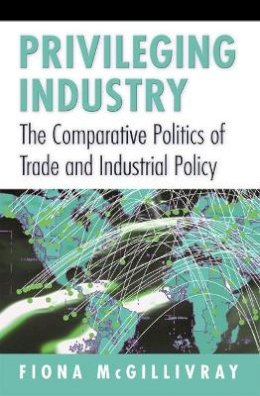
Stock image for illustration purposes only - book cover, edition or condition may vary.
Privileging Industry: The Comparative Politics of Trade and Industrial Policy
Fiona McGillivray
€ 58.31
FREE Delivery in Ireland
Description for Privileging Industry: The Comparative Politics of Trade and Industrial Policy
Paperback. Shows why aiding an industry can be a politically efficient way for a government to redistribute resources from one industrial sector to another. This book explores how electoral rules, party strength, and industrial geography affect redistribution politics across countries. Num Pages: 224 pages, 7 line illus. 15 tables. BIC Classification: JPA; KN. Category: (P) Professional & Vocational; (U) Tertiary Education (US: College). Dimension: 229 x 152 x 13. Weight in Grams: 314.
Why do some industries win substantial protection from the whims of international trade while others do not? Privileging Industry challenges standard approaches to this question in its examination of when governments use trade and industrial policy for political goals. Fiona McGillivray shows why aiding an industry can be a politically efficient way for a government to redistribute resources from one industrial sector to another. Taking a comparative perspective that stands in contrast with the usual focus on U.S. trade politics, she explores, for example, how electoral rules, party strength, and industrial geography affect redistribution politics across countries. How do political institutions and the geographical dispersion of industries interact to determine which industries governments privilege? What tests can assess how governments distribute assistance across industries? Research has focused on the industries that legislators want to protect, but just as important is identifying those legislators able to deliver trade assistance. Assisting an industry requires both a will and a means. Whether an industry is a good vehicle through which to redistribute income depends on its geographic make-up and the country's electoral system. In turn, the electoral system and party strength affect how legislators' preferences contribute to policy. McGillivray tests these arguments using a tariff-based empirical test and nonstandard dependent variables such as the dispersion of stock prices within fourteen different capital markets, and government influence in the targeting of plant closures within declining industries.
Product Details
Format
Paperback
Publication date
2004
Publisher
Princeton University Press
Number of pages
224
Condition
New
Number of Pages
224
Place of Publication
New Jersey, United States
ISBN
9780691027708
SKU
V9780691027708
Shipping Time
Usually ships in 7 to 11 working days
Ref
99-1
About Fiona McGillivray
Fiona McGillivray is Assistant Professor of Politics at New York University.
Reviews for Privileging Industry: The Comparative Politics of Trade and Industrial Policy
Winner of the 2005 William H. Riker Book Award, Political Economy Section of the American Political Science Association
